Full Text Searchable PDF User Manual
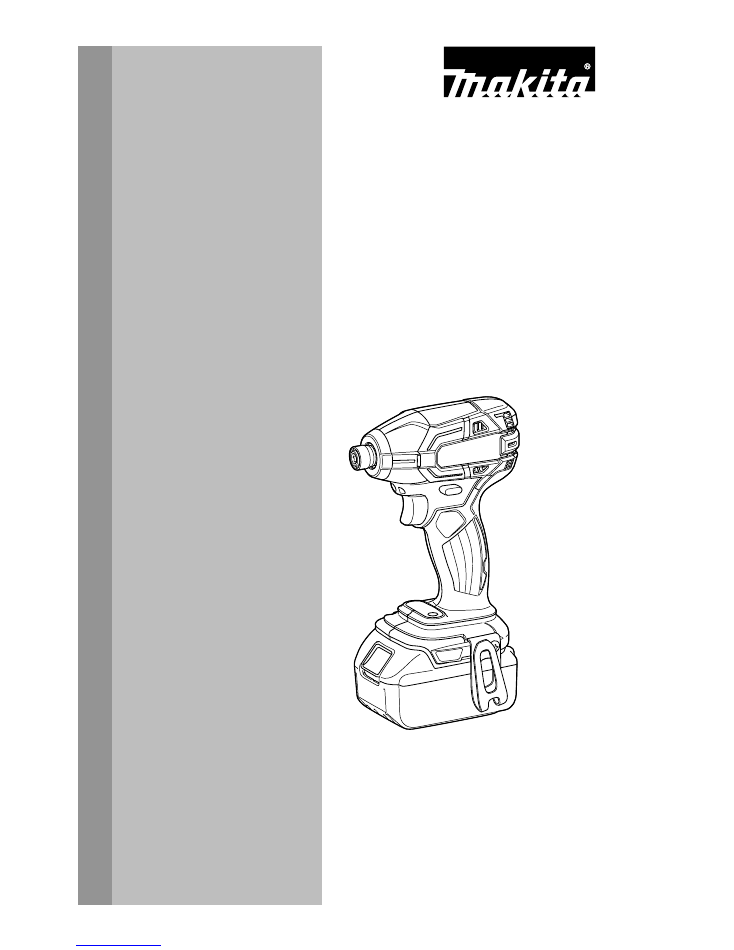
1
ENGLISH (
O
rigina
l in
st
ruct
ions)
INSTRUCTION MANUAL
IMPORTANT:
Read Before Using.
Cordless Oil-Pulse Driver
DTS131
DTS141
015149
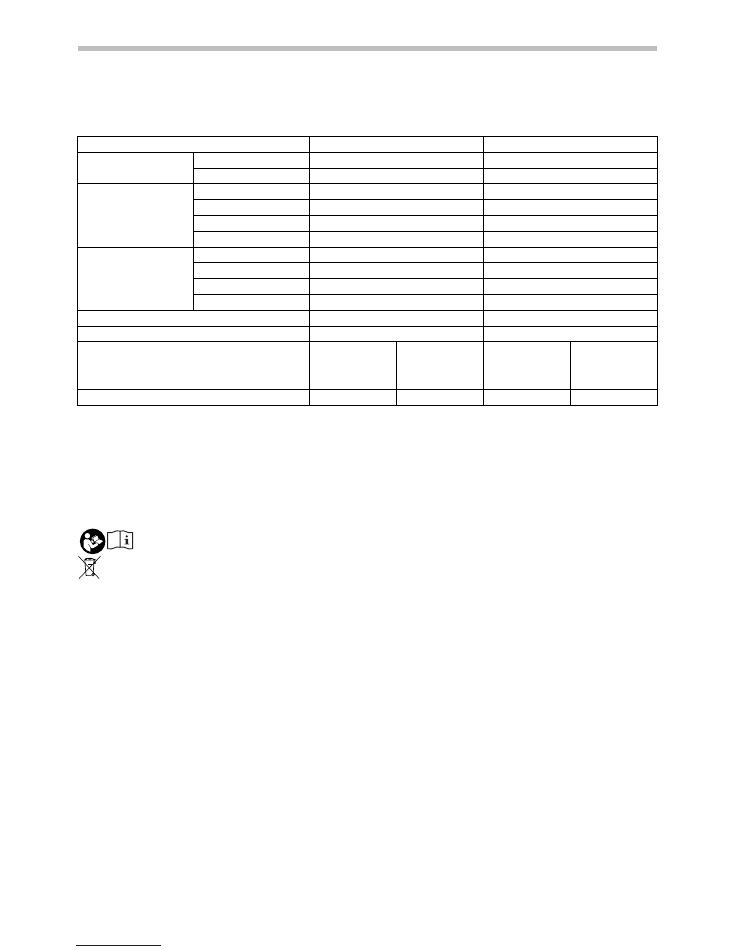
2
ENGLISH (Original instructions)
SPECIFICATIONS
Model DTS131
DTS141
Machine screw
4 mm - 8 mm
4 mm - 8 mm
Capacities
Standard bolt
5 mm - 8 mm
5 mm - 8 mm
Impact mode (Hard)
0 - 3,000 min
-1
0 - 3,200 min
-1
Impact mode (Medium)
0 - 2,000 min
-1
0 - 2,000 min
-1
Impact mode (Soft)
0 - 1,200 min
-1
0 - 1,200 min
-1
No load speed
T mode
0 - 1,200 min
-1
0 - 1,200 min
-1
Impact mode (Hard)
0 - 2,500 min
-1
0 - 2,700 min
-1
Impact mode (Medium)
0 - 2,200 min
-1
0 - 2,200 min
-1
Impact mode (Soft)
0 - 1,400 min
-1
0 - 1,400 min
-1
Impacts per minute
T mode
0 - 1,400 min
-1
0 - 1,400 min
-1
Rated voltage
D.C. 14.4 V
D.C. 18 V
Overall length
136 mm
136 mm
Battery cartridge
BL1415 /
BL1415N
BL1430 / BL1440 /
BL1450
BL1815 / BL1815N /
BL1820 / BL1820B
BL1830 / BL1840 /
BL1840B / BL1850 /
BL1850B
Net weight
1.2 kg
1.4 kg
1.2 kg
1.5 kg
• Due to our continuing program of research and development, the specifications herein are subject to change without notice.
• Specifications and battery cartridge may differ from country to country.
• Weight, with battery cartridge, according to EPTA-Procedure 01/2003
END004-6
Symbols
The following show the symbols used for the equipment.
Be sure that you understand their meaning before use.
・
Read instruction manual.
・
Only for EU countries
Do not dispose of electric equipment or
battery pack together with household
waste material!
In observance of the European
Directives, on Waste Electric and
Electronic Equipment and Batteries and
Accumulators and Waste Batteries and
Accumulators and their implementation
in accordance with national laws,
electric equipment and batteries and
battery pack(s) that have reached the
end of their life must be collected
separately and returned to an
environmentally compatible recycling
facility.
ENE033-1
Intended use
The tool is intended for screw driving in wood, metal
and plastic.
ENG905-1
Noise
The typical A-weighted noise level determined
according to EN60745:
(In soft impact force grade)
Sound pressure level (L
pA
) : 77 dB (A)
Uncertainty (K) : 3 dB (A)
The noise level under working may exceed 80 dB (A).
Wear ear protection
ENG900-1
Vibration
The vibration total value (tri-axial vector sum)
determined according to EN60745:
(In soft impact force grade)
Work mode : impact tightening of fasteners of the
maximum capacity of the tool
Vibration emission (a
h
) : 7.0 m/s
2
Uncertainty (K) : 1.5 m/s
2
ENG901-1
•
The declared vibration emission value has been
measured in accordance with the standard test
method and may be used for comparing one tool
with another.
•
The declared vibration emission value may also be
used in a preliminary assessment of exposure.
Cd
Ni-MH
Li-ion

3
WARNING:
•
The vibration emission during actual use of the power
tool can differ from the declared emission value
depending on the ways in which the tool is used.
•
Be sure to identify safety measures to protect the
operator that are based on an estimation of
exposure in the actual conditions of use (taking
account of all parts of the operating cycle such as
the times when the tool is switched off and when it
is running idle in addition to the trigger time).
ENH101-18
For European countries only
EC Declaration of Conformity
Makita declares that the following Machine(s):
Designation of Machine:
Cordless Oil-Pulse Driver
Model No./ Type: DTS131, DTS141
Conforms to the following European Directives:
2006/42/EC
They are manufactured in accordance with the following
standard or standardized documents:
EN60745
The technical file in accordance with 2006/42/EC is
available from:
Makita, Jan-Baptist Vinkstraat 2, 3070, Belgium
19.3.2014
000331
Yasushi Fukaya
Director
Makita, Jan-Baptist Vinkstraat 2, 3070, Belgium
GEA006-2
General Power Tool Safety
Warnings
WARNING Read all safety warnings and all
instructions.
Failure to follow the warnings and
instructions may result in electric shock, fire and/or
serious injury.
Save all warnings and
instructions for future reference.
The term "power tool" in the warnings refers to your
mains-operated (corded) power tool or battery-operated
(cordless) power tool.
Work area safety
1.
Keep work area clean and well lit.
Cluttered or
dark areas invite accidents.
2.
Do not operate power tools in explosive
atmospheres, such as in the presence of
flammable liquids, gases or dust.
Power tools
create sparks which may ignite the dust or fumes.
3.
Keep children and bystanders away while
operating a power tool.
Distractions can cause
you to lose control.
Electrical safety
4.
Power tool plugs must match the outlet. Never
modify the plug in any way. Do not use any
adapter plugs with earthed (grounded) power
tools.
Unmodified plugs and matching outlets will
reduce risk of electric shock.
5.
Avoid body contact with earthed or grounded
surfaces such as pipes, radiators, ranges and
refrigerators.
There is an increased risk of
electric shock if your body is earthed or grounded.
6.
Do not expose power tools to rain or wet
conditions.
Water entering a power tool will
increase the risk of electric shock.
7.
Do not abuse the cord. Never use the cord for
carrying, pulling or unplugging the power tool.
Keep cord away from heat, oil, sharp edges or
moving parts.
Damaged or entangled cords
increase the risk of electric shock.
8.
When operating a power tool outdoors, use an
extension cord suitable for outdoor use.
Use
of a cord suitable for outdoor use reduces the risk
of electric shock.
9.
If operating a power tool in a damp location is
unavoidable, use a ground fault circuit
interrupter (GFCI) protected supply.
Use of an
GFCI reduces the risk of electric shock.
Personal safety
10.
Stay alert, watch what you are doing and use
common sense when operating a power tool. Do
not use a power tool while you are tired or under
the influence of drugs, alcohol or medication.
A
moment of inattention while operating power tools
may result in serious personal injury.
11.
Use personal protective equipment. Always
wear eye protection.
Protective equipment such
as dust mask, non-skid safety shoes, hard hat, or
hearing protection used for appropriate conditions
will reduce personal injuries.
12.
Prevent unintentional starting. Ensure the
switch is in the off-position before connecting
to power source and/or battery pack, picking
up or carrying the tool.
Carrying power tools
with your finger on the switch or energising power
tools that have the switch on invites accidents.
13.
Remove any adjusting key or wrench before
turning the power tool on.
A wrench or a key
left attached to a rotating part of the power tool
may result in personal injury.

4
14.
Do not overreach. Keep proper footing and
balance at all times.
This enables better control
of the power tool in unexpected situations.
15.
Dress properly. Do not wear loose clothing or
jewellery. Keep your hair, clothing, and gloves
away from moving parts.
Loose clothes,
jewellery or long hair can be caught in moving
parts.
16.
If devices are provided for the connection of
dust extraction and collection facilities,
ensure these are connected and properly
used.
Use of dust collection can reduce dust-
related hazards.
Power tool use and care
17.
Do not force the power tool. Use the correct
power tool for your application.
The correct
power tool will do the job better and safer at the
rate for which it was designed.
18.
Do not use the power tool if the switch does
not turn it on and off.
Any power tool that
cannot be controlled with the switch is dangerous
and must be repaired.
19.
Disconnect the plug from the power source
and/or the battery pack from the power tool
before making any adjustments, changing
accessories, or storing power tools.
Such
preventive safety measures reduce the risk of
starting the power tool accidentally.
20.
Store idle power tools out of the reach of
children and do not allow persons unfamiliar
with the power tool or these instructions to
operate the power tool.
Power tools are
dangerous in the hands of untrained users.
21.
Maintain power tools. Check for misalignment
or binding of moving parts, breakage of parts
and any other condition that may affect the
power tool’s operation. If damaged, have the
power tool repaired before use.
Many
accidents are caused by poorly maintained power
tools.
22.
Keep cutting tools sharp and clean.
Properly
maintained cutting tools with sharp cutting edges
are less likely to bind and are easier to control.
23.
Use the power tool, accessories and tool bits
etc. in accordance with these instructions,
taking into account the working conditions
and the work to be performed.
Use of the
power tool for operations different from those
intended could result in a hazardous situation.
Battery tool use and care
24.
Recharge only with the charger specified by
the manufacturer.
A charger that is suitable for
one type of battery pack may create a risk of fire
when used with another battery pack.
25.
Use power tools only with specifically
designated battery packs.
Use of any other
battery packs may create a risk of injury and fire.
26.
When battery pack is not in use, keep it away
from other metal objects, like paper clips,
coins, keys, nails, screws or other small metal
objects, that can make a connection from one
terminal to another.
Shorting the battery
terminals together may cause burns or a fire.
27.
Under abusive conditions, liquid may be
ejected from the battery; avoid contact. If
contact accidentally occurs, flush with water.
If liquid contacts eyes, additionally seek
medical help.
Liquid ejected from the battery
may cause irritation or burns.
Service
28.
Have your power tool serviced by a qualified
repair person using only identical
replacement parts.
This will ensure that the
safety of the power tool is maintained.
29.
Follow instruction for lubricating and
changing accessories.
30.
Keep handles dry, clean and free from oil and
grease.
GEB054-3
CORDLESS IMPACT DRIVER
SAFETY WARNINGS
1.
Hold power tool by insulated gripping
surfaces, when performing an operation
where the fastener may contact hidden wiring.
Fasteners contacting a "live" wire may make
exposed metal parts of the power tool "live" and
could give the operator an electric shock.
2.
Always be sure you have a firm footing.
Be sure no one is below when using the tool
in high locations.
3.
Hold the tool firmly.
4.
Wear ear protectors.
5.
Do not touch the bit or the workpiece
immediately after operation. They may be
extremely hot and could burn your skin.
6.
Keep hands away from rotating parts.
SAVE THESE INSTRUCTIONS.
WARNING:
DO NOT let comfort or familiarity with product
(gained from repeated use) replace strict adherence
to safety rules for the subject product.
MISUSE or failure to follow the safety rules stated in
this instruction manual may cause serious personal
injury.
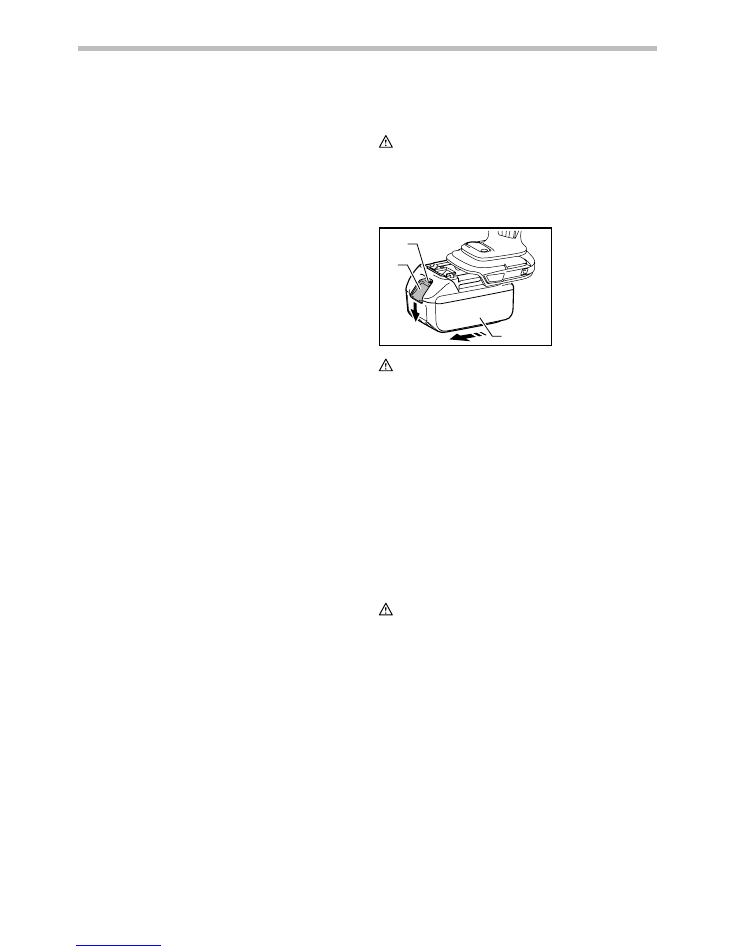
5
ENC007-9
IMPORTANT SAFETY
INSTRUCTIONS
FOR BATTERY CARTRIDGE
1.
Before using battery cartridge, read all
instructions and cautionary markings on (1)
battery charger, (2) battery, and (3) product
using battery.
2.
Do not disassemble battery cartridge.
3.
If operating time has become excessively
shorter, stop operating immediately. It may
result in a risk of overheating, possible burns
and even an explosion.
4.
If electrolyte gets into your eyes, rinse them
out with clear water and seek medical
attention right away. It may result in loss of
your eyesight.
5.
Do not short the battery cartridge:
(1)
Do not touch the terminals with any
conductive material.
(2)
Avoid storing battery cartridge in a
container with other metal objects such
as nails, coins, etc.
(3)
Do not expose battery cartridge to water
or rain.
A battery short can cause a large current flow,
overheating, possible burns and even a
breakdown.
6.
Do not store the tool and battery cartridge in
locations where the temperature may reach or
exceed 50
゚
C (122
゚
F).
7.
Do not incinerate the battery cartridge even if
it is severely damaged or is completely worn
out. The battery cartridge can explode in a fire.
8.
Be careful not to drop or strike battery.
9.
Do not use a damaged battery.
10.
Follow your local regulations relating to
disposal of battery.
SAVE THESE INSTRUCTIONS.
Tips for maintaining maximum battery life
1.
Charge the battery cartridge before
completely discharged.
Always stop tool operation and charge the
battery cartridge when you notice less tool power.
2.
Never recharge a fully charged battery cartridge.
Overcharging shortens the battery service life.
3.
Charge the battery cartridge with room temperature
at 10
゚
C - 40
゚
C (50
゚
F - 104
゚
F). Let a hot battery
cartridge cool down before charging it.
4.
Charge the battery cartridge if you do not use
it for a long period (more than six months).
FUNCTIONAL DESCRIPTION
CAUTION:
•
Always be sure that the tool is switched off and the
battery cartridge is removed before adjusting or
checking function on the tool.
Installing or removing battery cartridge
1
2
3
014963
CAUTION:
•
Always switch off the tool before installing or
removing of the battery cartridge.
•
Hold the tool and the battery cartridge firmly
when installing or removing battery cartridge.
Failure to hold the tool and the battery cartridge
firmly may cause them to slip off your hands and
result in damage to the tool and battery cartridge
and a personal injury.
To remove the battery cartridge, slide it from the tool
while sliding the button on the front of the cartridge.
To install the battery cartridge, align the tongue on the
battery cartridge with the groove in the housing and slip
it into place. Insert it all the way until it locks in place
with a little click. If you can see the red indicator on the
upper side of the button, it is not locked completely.
CAUTION:
•
Always install the battery cartridge fully until the
red indicator cannot be seen. If not, it may
accidentally fall out of the tool, causing injury to
you or someone around you.
•
Do not install the battery cartridge forcibly. If the
cartridge does not slide in easily, it is not being
inserted correctly.
1. Red indicator
2. Button
3. Battery cartridge
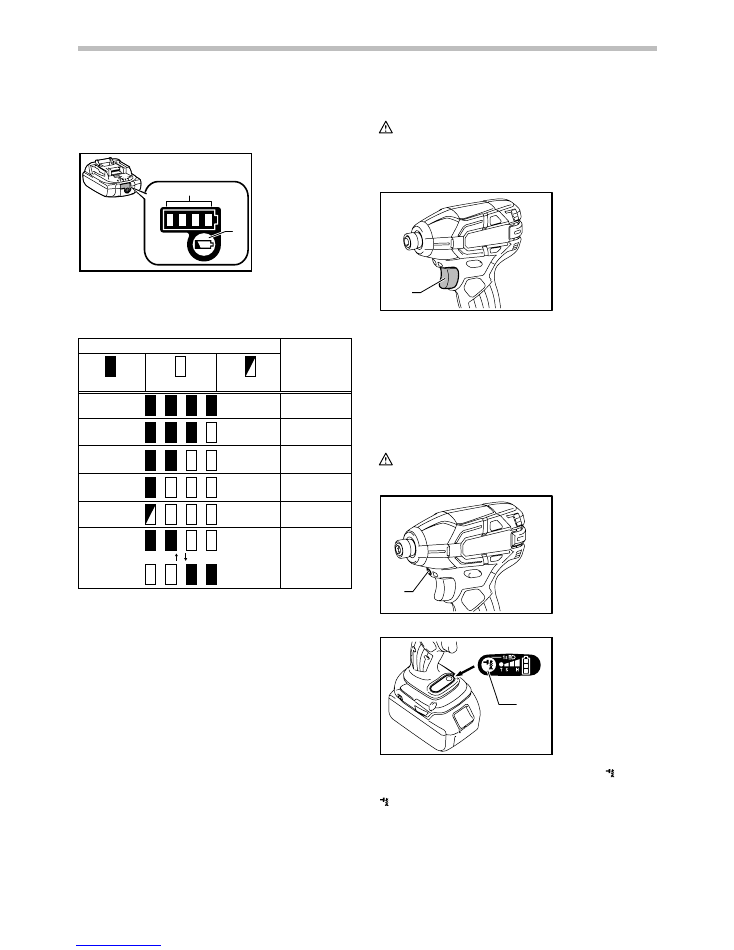
6
Indicating the remaining battery capacity
(Only for battery cartridges with "B" at the end of the
model number.)
1
2
015659
Press the check button on the battery cartridge to
indicate the remaining battery capacity. The indicator
lamps light up for few seconds.
Off
Blinking
Lighted
Indicator lamps
Charge the
battery.
0% to 25%
25% to 50%
50% to 75%
75% to 100%
Remaining
capacity
The battery
may have
malfunctioned.
015658
NOTE:
•
Depending on the conditions of use and the
ambient temperature, the indication may differ
slightly from the actual capacity.
Switch action
CAUTION:
•
Before inserting the battery cartridge into the tool, always
check to see that the switch trigger actuates properly
and returns to the "OFF" position when released.
1
015150
To start the tool, simply pull the switch trigger. Tool
speed is increased by increasing pressure on the switch
trigger. Release the switch trigger to stop.
NOTE:
•
The tool automatically stops if you keep pulling the
switch trigger for about 360 seconds.
Lighting up the front lamp
CAUTION:
•
Do not look in the light or see the source of light directly.
1
015151
1
014966
To turn on the lamp status, press the button
for few
seconds. To turn off the lamp status, press the button
for few seconds again.
With the lamp status ON, pull the switch trigger to turn
on the lamp. To turn off, release it. The lamp goes out
approximately 10 seconds after releasing the switch
trigger.
1. Indicator lamps
2. Check button
1. Button
1. Lamp
1. Switch trigger
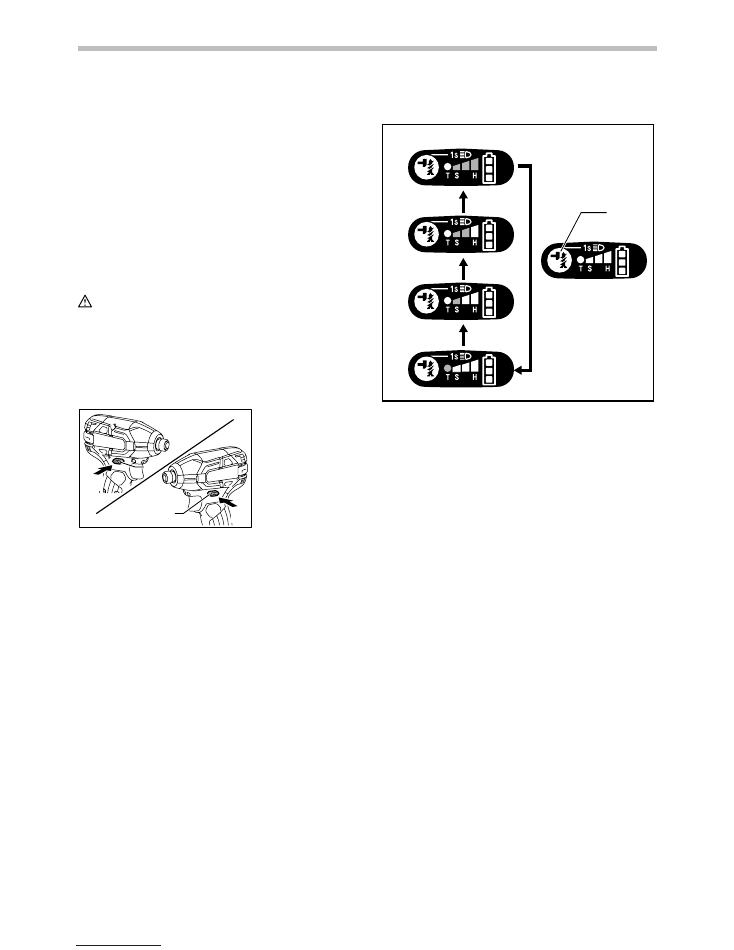
7
With the lamp status OFF, the lamp will not turn on even
if the trigger is pulled.
NOTE:
•
To confirm the lamp status, pull the trigger. When
the lamp lights up by pulling the switch trigger, the
lamp status is ON. When the lamp does not come
on, the lamp status is OFF.
•
While pulling the switch trigger, the lamp status
cannot be changed.
•
For approximately 10 seconds after releasing the
switch trigger, the lamp status can be changed.
Reversing switch action
CAUTION:
•
Always check the direction of rotation before operation.
•
Use the reversing switch only after the tool comes
to a complete stop. Changing the direction of
rotation before the tool stops may damage the tool.
•
When not operating the tool, always set the
reversing switch lever to the neutral position.
1
1
A
B
015152
This tool has a reversing switch to change the direction
of rotation. Depress the reversing switch lever from the
A side for clockwise rotation or from the B side for
counterclockwise rotation.
When the reversing switch lever is in the neutral
position, the switch trigger cannot be pulled.
Characteristics of Cordless Oil-impulse Driver
The Makita Cordless Oil-impulse Driver is a hydraulically
operated impact tool using oil viscosity to produce impacts.
Since oil viscosity changes with the temperature, be aware of
the following two points when operating the tool.
1. Avoid using the tool below -10 ºC (14 ºF) of
temperature. When the tool temperature goes
down below the degrees, this may cause damage
to the motor of tool due to poor impulse.
2. When the tool becomes too hot, it may take
longer to set screws.
3.
The tool can overheat, causing a failure or hand
burn if you operate it continuously for long hours.
Let the tool cool off for more than 30 minutes
before changing batteries during a long,
continuous job.
Changing the impact force
1
2
3
4
5
6
012609
1. Changed in four steps
2. Hard
3. Medium
4. Soft
5. T mode
6. Button
1. Reversing
switch lever
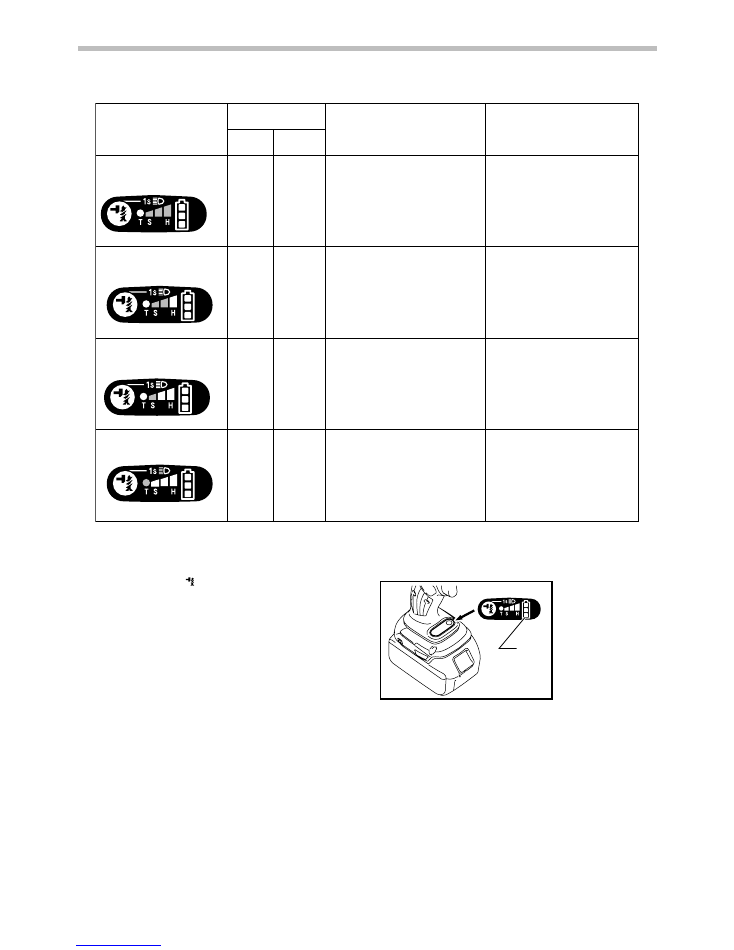
8
I
mpact
force
grade
d
i
sp
l
ayed
on
pane
l
M
a
xi
mum
b
l
o
w
s
A
pp
li
cat
i
on
W
ork
H
ard
M
ed
i
um
S
oft
Ti
ghten
i
ng
w
hen
force
and
speed
are
des
i
red
.
Ti
ghten
i
ng
w
hen
a
good
f
i
n
i
sh
i
ng
i
s
needed
.
Ti
ghten
i
ng
w
hen
e
x
cess
i
ve
t
i
ghten
i
ng
need
to
be
avo
i
ded
because
of
potent
i
a
ll
y
c
l
ogged
fema
l
e
scre
w
and
broken
or
damaged
scre
w
head
.
Ti
ghten
i
ng
i
n
under
w
ork
mater
i
a
l / Ti
ghten
i
ng
l
ong
scre
w
s
.
1
,4
00
(
m
i
n
-
1
)
1
,4
00
(
m
i
n
-
1
)
1
,4
00
(
m
i
n
-
1
)
1
,4
00
(
m
i
n
-
1
)
2
,
200
(
m
i
n
-
1
)
2
,
200
(
m
i
n
-
1
)
2
,
500
(
m
i
n
-
1
)
DTS
1
3
1
DTS
1
4
1
T
mode
Ti
ghten
i
ng
w
hen
speed
and
good
f
i
n
i
sh
i
ng
are
needed
.
Ti
ghten
i
ng
bo
l
t
up
to
M8.
Ti
ghten
i
ng
sash
scre
w/
Ti
ghten
i
ng
sma
ll
scre
w
s
such
as
M6.
Ti
ghten
i
ng
bo
l
t
up
to
M8.
Ti
ghten
i
ng
i
n
the
f
i
n
i
sh
i
ng
board
,
p
l
aster
board
.
2
,
700
(
m
i
n
-
1
)
Ti
ghten
i
ng
w
hen
speed
and
good
f
i
n
i
sh
i
ng
are
needed
.
015147
The impact force can be changed in four steps: hard,
medium, soft, and T mode.
This allows a tightening suitable to the work.
Every time the button
is pressed, the number of blows
changes in four steps.
For approximately one minute after releasing the switch
trigger, the impact force can be changed.
"T" is a special mode for fastening self drilling screws
and bolts. In this mode, the tool starts to drive a screw
with faster rotation, which is suited for drilling with the
self-drilling -screw tip. Once the tool starts to tighten the
screw, it impacts in soft force grade.
NOTE:
•
When all lamps on the switch panel go out, the tool
is turned off to save the battery power. The impact
force grade can be checked by pulling the switch
trigger to the extent that the tool does not operate.
•
While pulling the switch trigger, the impact force
grade cannot be changed.
•
The tool automatically stops to prevent the
damages on the parts during heavy load operation
with hard or medium impact force grade. In that
case select the soft or T mode impact force grade.
Indicating the remaining battery capacity
(Country specific)
1
014994
When you pull the switch trigger, the LED display shows
the remaining battery capacity.
The remaining battery capacity is shown as the
following table.
1. Battery capacity
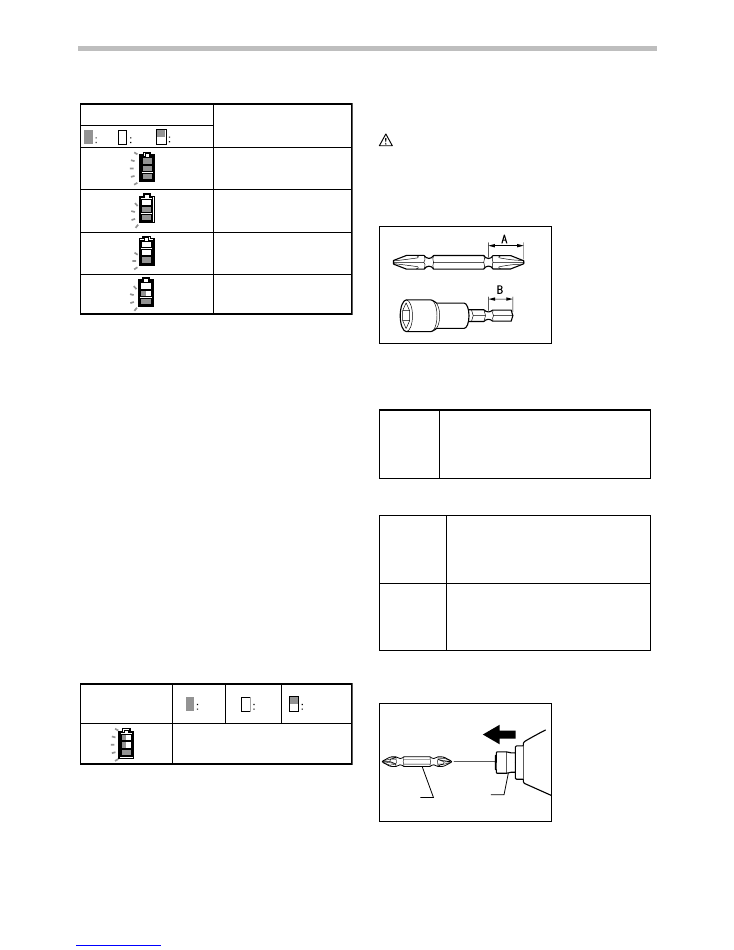
9
Battery indicator status
Remaining battery capacity
50% - 100%
20% - 50%
0% - 20%
Charge the battery
On
Off
Blinking
015191
NOTE:
•
Approximately one minute after the motor stops,
the indicators go off to save the battery power. To
check the remaining battery capacity, slightly pull
the switch trigger.
Tool / battery protection system
The tool is equipped with a tool/battery protection
system. This system automatically cuts off power to the
motor to extend tool and battery life.
The tool will automatically stop during operation if the
tool or battery are placed under one of the following
conditions. In some conditions, the indicator lights up.
Overload protection
When the tool is operated in a manner that causes it to
draw an abnormally high current, the tool automatically
stops without any indications. In this situation, turn the
tool off and stop the application that caused the tool to
become overloaded. Then turn the tool on to restart.
Overheat protection for tool
When the tool is overheated, the tool stops
automatically and the battery indicator shows following
state. In this situation, let the tool cool before turning the
tool on again.
Battery indicator
Tool is overheated
On
Off
Blinking
015192
ASSEMBLY
CAUTION:
•
Always be sure that the tool is switched off and the
battery cartridge is removed before carrying out
any work on the tool.
Installing or removing driver bit or socket bit
004521
Use only bits that has inserting portion shown in the
figure.
For tool with shallow bit hole
A
=12mm
B=9mm
Use only these type of bit. Follo
w
the
procedure
(
1
)
.
(
Note
)
Bit-piece is not necessary.
006348
For tool with deep bit hole
To install these types of bits
,
follo
w
the procedure
(
1
)
.
To install these types of bits
,
follo
w
the procedure
(
2
)
.
(
Note
)
Bit-piece is necessary for
installing the bit.
A
=17mm
B=14mm
A
=12mm
B=9mm
011405
Procedure 1
For tool with normal sleeve
1
2
011406
1. Bit
2. Sleeve
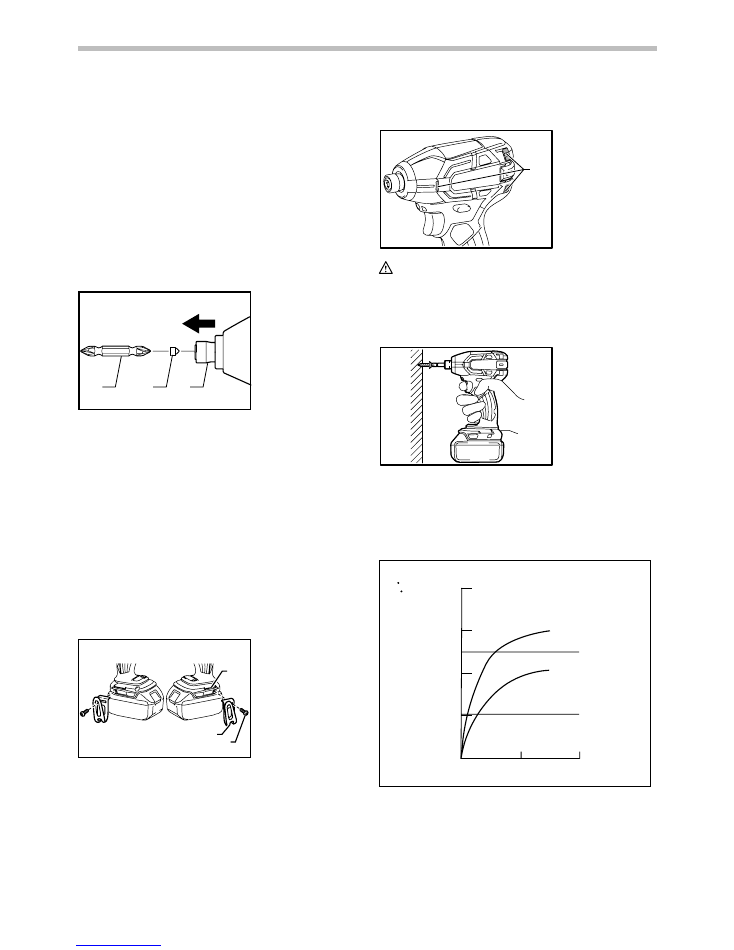
10
To install the bit, pull the sleeve in the direction of the
arrow and insert the bit into the sleeve as far as it will go.
Then release the sleeve to secure the bit.
For tool with one-touch type sleeve
To install the bit, insert the bit into the sleeve as far as it
will go.
Procedure 2
In addition to the procedure(1) above, insert the bit-
piece into the sleeve with its pointed end facing in.
1
2
3
011407
To remove the bit, pull the sleeve in the direction of the
arrow and pull the bit out.
NOTE:
•
If the bit is not inserted deep enough into the
sleeve, the sleeve will not return to its original
position and the bit will not be secured. In this
case, try re-inserting the bit according to the
instructions above.
•
When it is difficult to insert the bit, pull the sleeve
and insert it into the sleeve as far as it will go.
•
After inserting the bit, make sure that it is firmly
secured. If it comes out, do not use it.
Hook
1
2
3
014969
The hook is convenient for temporarily hanging the tool.
This can be installed on either side of the tool.
To install the hook, insert it into a groove in the tool
housing on either side and then secure it with a screw.
To remove, loosen the screw and then take it out.
OPERATION
1
015158
CAUTION:
•
Never obstruct the air vents on the side of the tool
for cooling down oil unit and motor during
operation. Failure to do so may cause the tool
excessive heat and damage.
015153
The proper fastening torque may differ depending upon
the kind or size of the screw/bolt, the material of the
workpiece to be fastened, etc. The relation between
fastening torque and fastening time is shown in the
figures.
S
tandard bolt
N m
Fastening torque
Fastening time
(S)
Proper fastening torque
(
kgf cm
)
20
(
204
)
15
(
15
3)
10
(
102
)
5
(
51
)
0
1.0
2.0
M6
M8
M8
M6
015298
1. Vent
1. Groove
2. Hook
3. Screw
1. Bit
2. Bit-piece
3. Sleeve
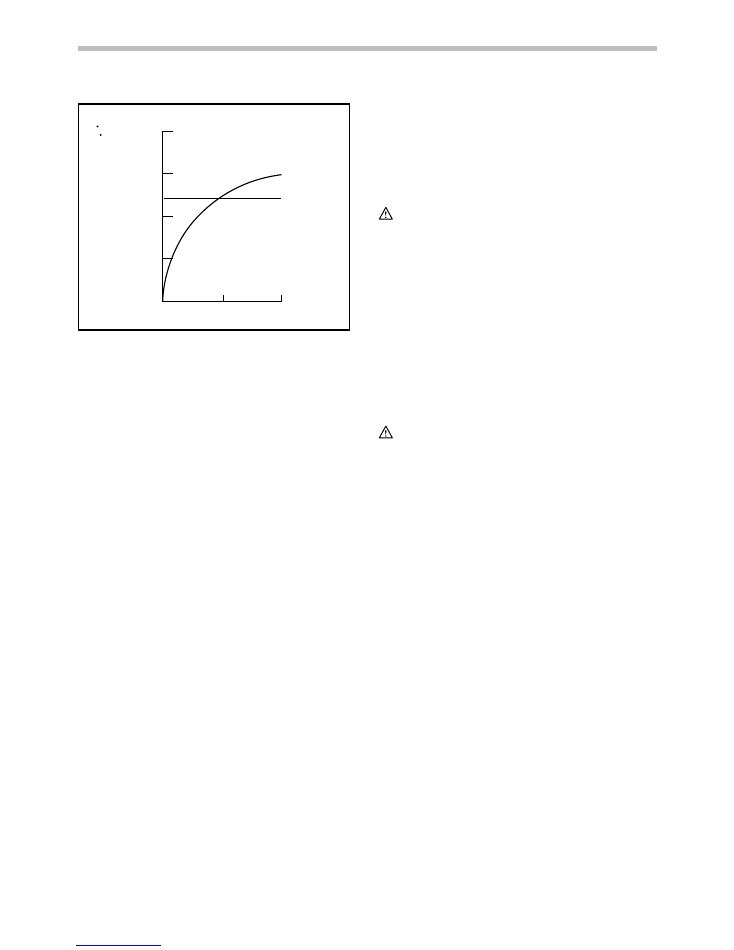
11
High tensile bolt
N m
Fastening torque
Fastening time
(S)
Proper fastening torque
(
kgf cm
)
0
1.0
2.0
M6
M6
20
(
204
)
15
(
15
3)
10
(
102
)
5
(
51
)
015299
Hold the tool firmly and place the point of the driver bit
in the screw head. Apply forward pressure to the tool to
the extent that the bit will not slip off the screw and turn
the tool on to start operation.
NOTE:
•
Use the proper bit for the head of the screw/bolt
that you wish to use.
•
Choose a proper impact force and carefully adjust
pressure on the switch trigger so that the screw is
not damaged.
•
Hold the tool pointed straight at the screw.
•
For tightening bolt, select the soft or T mode
impact force grade.
•
If the impact force is too strong you tighten the screw for
a time longer than shown in the figures, the screw or the
point of the driver bit may be overstressed, stripped,
damaged, etc. Before starting your job, always perform
a test operation to determine the proper fastening time
for your screw.
The fastening torque is affected by a wide variety of
factors including the following. After fastening, always
check the torque with a torque wrench.
1.
When the battery cartridge is discharged almost
completely, voltage will drop and the fastening
torque will be reduced.
2.
Driver bit or socket bit
Failure to use the correct size driver bit or socket
bit will cause a reduction in the fastening torque.
3. Bolt
•
Even though the torque coefficient and the class of
bolt are the same, the proper fastening torque will
differ according to the diameter of bolt.
•
Even though the diameters of bolts are the
same, the proper fastening torque will differ
according to the torque coefficient, the class
of bolt and the bolt length.
4.
The manner of holding the tool or the material of
driving position to be fastened will affect the
torque.
5. Operating the tool at low speed will cause a
reduction in the fastening torque.
MAINTENANCE
CAUTION:
•
Always be sure that the tool is switched off and the
battery cartridge is removed before attempting to
perform inspection or maintenance except for the
following troubleshooting related to the light.
•
Never use gasoline, benzine, thinner, alcohol or
the like. Discoloration, deformation or cracks may
result.
To maintain product SAFETY and RELIABILITY, repairs,
any other maintenance or adjustment should be
performed by Makita Authorized Service Centers,
always using Makita replacement parts.
OPTIONAL ACCESSORIES
CAUTION:
•
These accessories or attachments are
recommended for use with your Makita tool
specified in this manual. The use of any other
accessories or attachments might present a risk of
injury to persons. Only use accessory or
attachment for its stated purpose.
If you need any assistance for more details regarding
these accessories, ask your local Makita Service Center.
•
Screw bits
•
Socket bits
•
Hook
•
Plastic carrying case
•
Makita genuine battery and charger
•
Bit-piece
•
Battery protector
•
Tool hanger
NOTE:
•
Some items in the list may be included in the tool
package as standard accessories. They may differ
from country to country.

12
www
.makita.com
M
akita
Jan-Baptist Vinkstraat 2
,
3
070
,
Belgium
M
akita Corporation
A
njo
,
A
ichi
,
Japan
885375A222